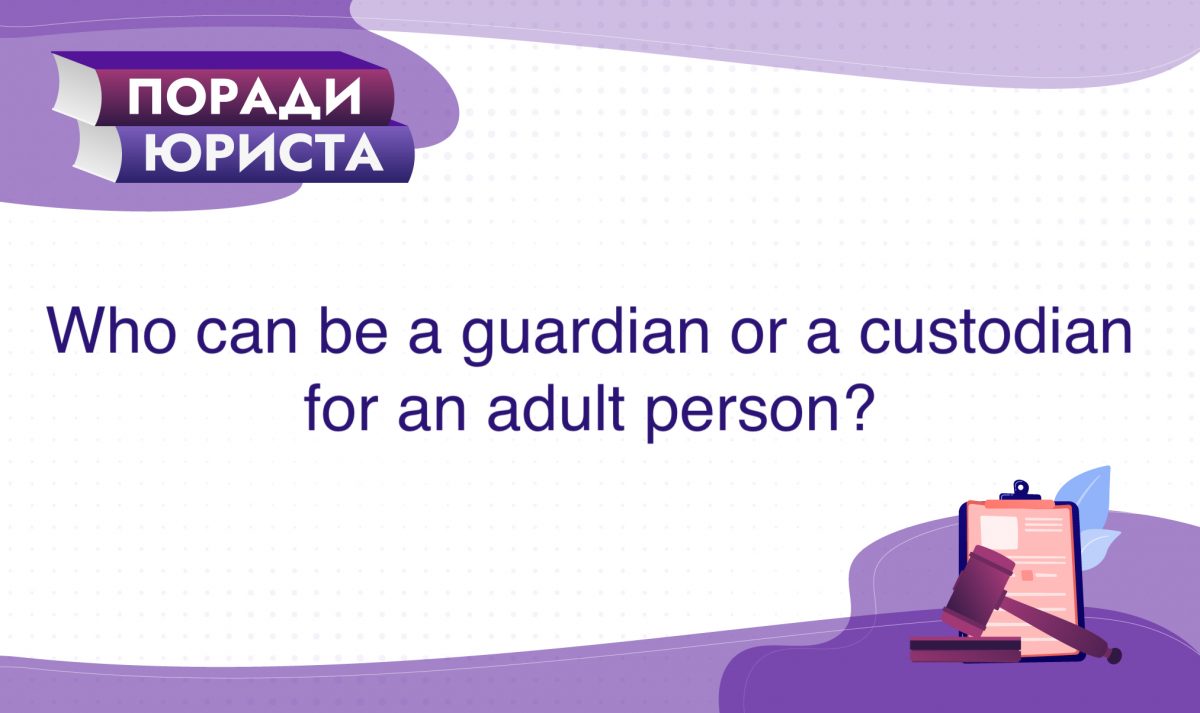Guardianship and custody are established to secure personal non-proprietary and proprietary rights of a full-grown person whose health status does not permit them to exercise their rights and perform duties; guardianship and custody are terminated in case the person’s civil capacity is renewed.
The right to guardianship and custody
The law secures the right of an individual recognized as incapable or whose civil capacity is restricted, to guardianship or custody.
The restricted civil capacity of a person
A court may limit the civil dispositive capacity of an individual if that person:
1) is suffering from a mental disorder that has a significant impact on their capacity to understand the meaning of their actions and/or control them;
2) abuses alcohol, drugs, toxic substances, gambling, etc., thus putting himself or herself, his or her family, and other persons whom he/she is legally obliged to maintain, in challenging financial circumstances.
A petition to limit the civil dispositive capacity of a person can be submitted by his/her family members, guardianship and custody authority, drug addiction, or mental health facility.
The legal consequences of an individual’s civil dispositive capacity restriction
- Individuals with limited civil dispositive capacity are placed under guardianship;
- An individual with limited civil dispositive capacity may carry out only minor domestic transactions independently;
- Transactions involving the disposal of assets and other non-minor, non-domestic transactions may be carried out by a person with limited civil dispositive capacity only with the consent of their guardian. Refusal by a guardian to consent to a non-minor, non-domestic transaction may be appealed against by a person with limited civil dispositive capacity before an agency of tutorship or guardianship or before a court;
- A guardian manages the receipt and disposal of wages, pensions, educational grants and other income on behalf of a person with limited civil dispositive capacity;
- A guardian may give written authorization to an individual with limited civil dispositive capacity to allow him/her independently to receive and dispose of his/her wages, pensions, educational grants and other income.
Requirements to guardians and custodians
- Only an individual with full civil dispositive capacity can become a guardian or a custodian.
- A guardian or a custodian is appointed primarily from family members or related persons, with consideration given to their personal relations with the individual and the capacity to perform the duties of a guardian or a custodian. An individual can be assigned one or several guardians or custodians.
- An individual cannot become a guardian or a custodian if: this individual is deprived of the parental rights which have not been renewed; the individual’s conduct and interests are in conflict with the interests of the individual in need of guardianship or custody.
- The guardian is obliged to take care of the person under care, to create the necessary living conditions for him/her, ensure his/her care and treatment; take actions to protect the civil rights and interests of the person under guardianship (take care to ensure availability of the necessary medications and care, establish proper living conditions, represent his/her interests).
The procedure of appointing guardians and custodians for full-grown persons
- A guardian (custodian) for an incapable individual (an individual with limited civil dispositive capacity) is appointed by court upon request of the guardianship and custody authority.
- A request to appoint a guardian to an individual recognized incapable, can be submitted to court both by the guardianship and custody authority, and by the individual willing to become a guardian.
- The guardian is a legal representative of the individual recognized incapable.
Dismissal of a guardian or a custodian
- The court, if it has appointed the guardian or the custodian, or the custody authority upon the individual’s request, relieves the individual from the powers of a guardian or a custodian. The court or the guardianship and custody authority review the request for one month. The individual continues performing the duties of the guardian or the custodian until the decision to relieve the individual from the powers of the guardian or the custodian is adopted or until the term of one month since the submission of the request is over, if the request has failed to be reviewed during this time.
- The court, if it has appointed the guardian or the custodian, or the custody authority can relieve the individual from the powers of a guardian or a custodian upon request of the individual under guardianship.
- The guardianship and custody authority at their own initiative, upon request of the person under care, governmental or civil organizations, and based on reasonable petitions of any person can initiate the procedure of relieving the individual from the powers of the guardian for failure to duly perform his/her duties.
- The court may relieve the individual from the powers of a guardian or a custodian upon petition of the guardianship and custody authority in case of failure to perform his/her duties, violation of the ward’s rights, and in case the person under care is placed to a school, health facility or a social protection facility.


